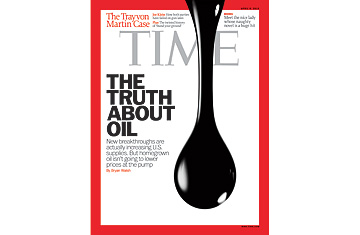
The waters of the Atlantic Ocean 180 miles east of Rio de Janeiro are a cobalt blue that appears bottomless. But it only seems that way. Some 7,000 ft. beneath the choppy surface lies the silent seafloor, and below that is 5,000 ft. of salt rock, deposited when the continents of South America and Africa went their separate ways 160 million years ago.
Underneath it all is oil. By one count, the presalt reservoirs off the central coast of Brazil hold as much as 100 billion barrels of crude; that's another Kuwait. It's why former Brazilian President Luiz Incio Lula da Silva called the presalt finds a "gift of God," and it's why the massive Cidade de Angra dos Reis floating oil-production facility--operated by Petrobras, Brazil's state-run oil giant--is anchored in the Atlantic, pumping 68,000 barrels of crude a day from one of the deepest wells in the world. The platform deck is so big you could play the Super Bowl on it, if not for the nest of interlocking pipes and valves that circulate oil, methane and steam throughout the ship. As I tour the deck in an orange safety jumper, a Petrobras engineer named Humberto Americano Romanus urges me to put a hand to one of the oil pipes. I can feel it pulse like an artery, the oil still warm from the deep heat of the earth. "It's 50 barrels a minute passing through here," he says over the din of the platform. "That's a lot of oil."
But not enough. Demand for oil is still rising--set to grow 800,000 barrels a day this year despite a still sluggish global economy. Meanwhile, production from places like Russia, Iran and Kuwait seems to be plateauing. The rigs that have gathered along the coast of Brazil are drilling deeper than ever before, through layers of salt rock, in some of the most complex and risky operations the industry has ever seen. "This reservoir is very heterogeneous, very challenging," says Jose Roberto Fagundes Netto, general manager of research and development for Petrobras. "But we know an accident is unacceptable." A well blowout like the one that caused the BP oil spill in 2010 would be even harder to contain in the deeper presalt waters.
This is the new world of extreme oil. Petrobras can afford to push the frontiers of offshore drilling because the price of Brent crude, a benchmark used by oil markets, is more than $120 a barrel, and last year it averaged $111, the highest average cost since the Drake well in Titusville, Pa., began spewing wealth in 1859, launching the petroleum era. From that time on, even despite J.D. Rockefeller's attempt to monopolize it, oil has experienced a 150-year price slide, interrupted by periodic spikes. The prices of all commodities fluctuate, but oil's irreplaceability--it's the fuel that makes us go--ensures that those spikes hurt. Last year oil soared in part because of geopolitics, especially the threat that Iran would block the Gulf of Hormuz and cut supplies. That uncertainty contributed to a risk premium of perhaps $20 or more a barrel. A promise by Saudi Arabia in late March to bring spare oil production onto the market has done little to calm prices.
